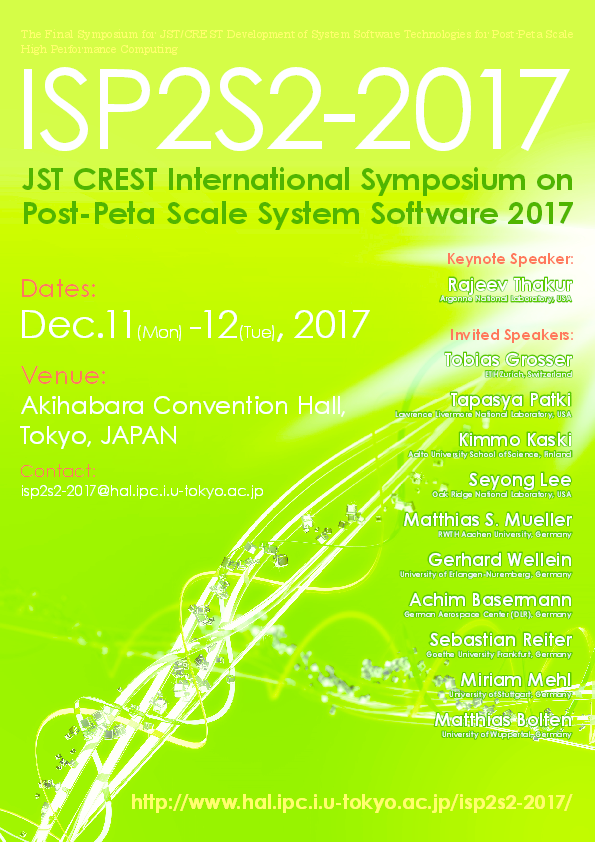| 10:00 - 10:20 |
Opening |
| 10:20 - 12:10 |
Session 1 (CREST/SPPEXA) Chair:Yaoko Nakagawa |
| 10:20 - 10:50 |
"Software Technology that Deals with Deeper Memory Hierarchy in Post-petascale Era"
Toshio Endo
abstract
|
| 10:50 - 11:20 |
"Power Management Framework for Post-Petascale Supercomputers"
Masaaki Kondo
abstract
|
| 11:20 - 11:50 |
"Project CASSIA: Framework for Exhaustive and Large-scale Social Simulation"
Itsuki Noda
abstract
|
| 11:50 - 12:10 |
"High Performance, High Productivity Programming through Domain Specialization"
Naoya Maruyama
abstract
|
| 12:10 - 13:30 |
Lunch Break |
| 13:30 - 14:30 |
Session 2 (Keynote) Chair:Mitsuhisa Sato
"Exascale Computing Project: Software Technology Perspective"
Rajeev Thakur
abstract
|
| 14:30 - 15:30 |
Session 3 (Invited Talk 1) Chair:Hiroshi Nakashima |
| 14:30 - 15:00 |
"Advanced Loop Transformation for Scalable Automatic GPU Mapping"
Tobias Grosser
abstract
|
| 15:00 - 15:30 |
"PowerStack: Enabling Efficient Power Management through Hierarchical Design"
Tapasya Patki
abstract
|
| 15:30 - 15:50 |
Break @ Hall B |
| 15:50 - 16:50 |
Session 4 (Invited Talk 2) Chair:Hiroaki Kobayashi |
| 15:50 - 16:20 |
"Social Physics: Data-Driven Discovery of Social Connectome"
Kimmo Kaski
abstract
|
| 16:20 - 16:50 |
"OpenARC: Extensible Compiler Framework for Directive-based, Efficient Heterogeneous Computing Study"
Seyong Lee
abstract
|
| 16:50 - 17:50 |
Panel Discussion Moderator: Mitsuhisa Sato |
| 16:50 - 17:50 |
"International Collaboration and Competition for Exascale Computing and Beyond"
Panelists: Rajeev Thakur, Tobias Grosser, Achim Basermann, Itsuki Noda, Taisuke Boku, Masaaki Kondo
|
| 17:50 - 18:00 |
|
| 18:00 - 19:30 |
Poster Session & Reception @ Hall B |


